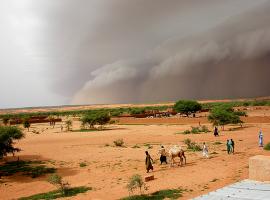If greenhouse gas emissions continue to climb, by the end of the century the average day in West Africa will be well outside of what people experience in today’s climate, according to new University of Leeds research published in Climatic Change. This is due to the region warming and the monsoon rains being disrupted in response to worsening global atmospheric carbon dioxide pollution. The paper visits a number of locations across the region, and gives the likelihood of what a ‘typical’ day will be like at each place, relative to the present climate.
“Without more drastic action to tackle climate change today, we are asking people to prepare for a future that we cannot presently comprehend. It is imperative that we address this ever-present emergency to reduce the risk of future inequality and suffering.”
Dr Rory Fitzpatrick, University of Leeds

African SWIFT scientists including Prof Doug Parker and Prof John Marsham contributed to the analysis which shows that the maximum and minimum temperatures of a typical day will be greater than the 99.5th percentile of pre-industrial temperatures. These extremes will be particularly noticeable in the spring and summer months. The monsoon rains will also become less reliable, according to researchers, which will make planting dates for farmers similarly less predictable.
Lead author on the paper, Dr Rory Fitzpatrick from the Institute of Climate and Atmospheric Science at the University of Leeds, argues that if climate communication relates projected changes back to what people know and experience in their daily lives and local environments, they might have a more visceral idea of what the future holds and be moved to act with greater urgency. The intention of this novel approach to framing climate model projection for the region is to make the scenarios more real for West African policy makers, by making the climate forecasts more relatable, relative to people’s personal experiences.
The study also considers mental health effects as well as the consequences for crop and livestock farming.
